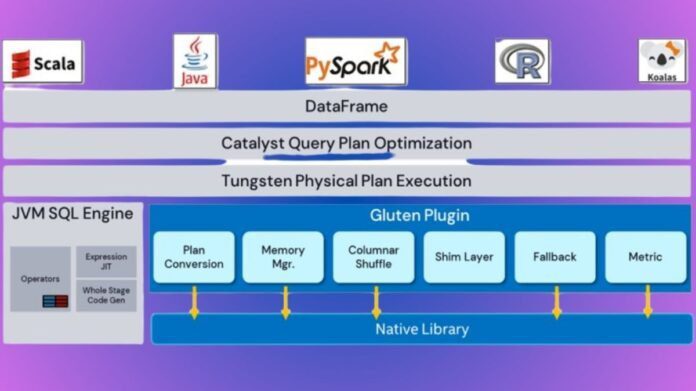The performance of Spark may be improved by using Intel CPUs and Gluten.
The tools and platforms that businesses use to evaluate the ever-increasing amounts of data that are coming in from devices, consumers, websites, and more are more crucial than ever. Efficiency and performance are crucial as big data analytics provides insights that are both business- and time-critical.
Workloads involving large data analytics on Apache Spark SQL often run constantly, necessitating excellent performance to accelerate time to insight. This implies that businesses may defend paying a bit more overall in order to get greater results for every dollar invested. It looked at Spark SQL performance on Google Cloud instances in the last blog.
Spark Enables Scalable Data Science
Apache Spark is widely used by businesses for large-scale SQL, machine learning and other AI applications, and batch and stream processing. To enable data science at scale, Spark employs a distributed paradigm; data is spread across many computers in clusters. Finding the data for every given query requires some overhead due to this dispersion. A key component of every Spark workload is query speed, which leads to quicker business decisions. This is particularly true for workloads including machine learning training.
Utilizing Gluten to Quicken the Spark
Although Spark is a useful tool for expediting and streamlining massive data processing, businesses have been creating solutions to improve it. Intel’s Optimized Analytics Package (OAP) Spark-SQL execution engine, Gluten, is one such endeavor that reduces computation-intensive vital data processing and transfers it to native accelerator libraries.
Gluten uses a vectorized SQL processing engine called Velox (Meta’s open-source) C++ generic database acceleration toolkit to improve data processing systems and query engines. A Spark plugin called Gluten serves as “a middle layer responsible for offloading the execution of JVM-based SQL engines to native engines.” The Apache Gluten plugin with Intel processor accelerators allow users to significantly increase the performance of their Spark applications.
It functions by converting the execution plans of Spark queries into Substrait, a cross-language data processing standard, and then sending the now-readable plans to native libraries via a JNI call. The execution plan is constructed, loaded, and handled effectively by the native engine (which also manages native memory allocation) before being sent back to Gluten as a Columnar Batch. The data is then sent back to Spark JVM as ArrowColumnarBatch by Gluten.
Gluten employs a shim layer to support different Spark versions and a fallback technique to execute vanilla Spark to handle unsupported operators. It captures native engine metrics and shows them in the Spark user interface.
While outsourcing as many compute-intensive data processing components to native code as feasible, the Gluten plugin makes use of Spark’s own architecture, control flow, and JVM code. Existing data frame APIs and applications will function as previously, although more quickly, since it doesn’t need any modifications on the query end.
Enhancements in Performance Was Observed
This section examines test findings that show how performance may be enhanced by using Gluten in your Spark applications. One uses 99 distinct database queries to construct a general-purpose decision support system based on TPC-DS. The other, which is based on TPC-H, uses ten distinct database queries to simulate a general-purpose decision support system. Everyone compared the time it took for a single user to finish each query once within the Spark SQL cluster for both.
Fourth Generation Intel Xeon Scalable Processors
Help start by examining how adding Gluten to Spark SQL on servers with 4th Generation Intel Xeon Scalable Processors affects performance. The performance increased by 3.12 times when it was added, as the chart below illustrates. The accelerator enabled the system to execute the 10 database queries over three times faster on the TPC-H-like workload. Gluten more than quadrupled the pace at which all 99 database queries were completed on the workload that resembled TCP-DS. Because of these enhancements, decision-makers would get answers more quickly, proving the benefit of incorporating Gluten into your Spark SQL operations.
Fifth Generation Intel Xeon Scalable Processors
Let’s now investigate how Gluten speeds up Spark SQL applications on servers equipped with Intel Xeon Scalable Processors of the Fifth Generation. With speed up to 3.34 times as high while utilizing Gluten, you saw even bigger increases than they experienced on the servers with older CPUs, as the accompanying chart illustrates. Incorporating Gluten into your environment will help you get more out of your technology and reduce time to insight if your data center has servers of this generation.
Cloud Implications
Even though they ran these tests in a data center using bare metal hardware, they amply illustrate how Gluten may boost performance even in the cloud. Using Spark in the cloud may allow you to take advantage of further performance enhancements by using Gluten.
In conclusion
Rapid analysis completion is essential to the success of your business, regardless of whether your Spark SQL workloads are running on servers with 5th version Intel Xeon Scalable Processors or the older version. By shifting JVM data processing to native libraries, Gluten may benefit from the speed improvement that Intel processors can provide with native libraries that are optimized to instruction sets.
According to these tests, you may easily double or even treble the speed at which your servers execute database queries by integrating the Gluten plugin into Spark SQL workloads. Using Gluten may help your company optimize data analytics workloads by offering up to 3.34x the performance.


